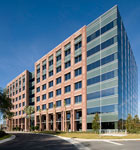At FIS Global, the world’s largest provider of banking and payments technology, being a green company isn’t about chasing LEED certifications or about constructing the latest ultra-energy-efficient office complex. It’s a simple philosophy about doing the right thing in the day-to-day. It’s about recognizing even the smallest opportunities for sustainable practices and making decisions that benefit the environment and the company.
Tony Kaufman is the vice president of real estate and facility operations with FIS, the fast-growing, Florida-based, financial-services-technology company that operates 138 facilities worldwide, serves 14,000 institutions, and recently placed 426 on the Fortune 500 list. He says that a huge part of FIS’s success with sustainability has been the company’s ability to build on small yet smart decisions about its energy policy. “When you start thinking about being green, or about sustainability, the decision to make the right choice is simple,” he says. “You just have to be paying attention.”
As it prepared to move into its new facility in Orlando, Florida, two years ago, FIS made sure that its commitment to sustainability would be reflected in small ways. The new space—200,000 square feet in total—has energy-efficient air-conditioning units. Its landscape and interior plumbing uses little water. And its lighting system relies on reflectors to illuminate spaces, rather than more energy-sucking bulbs. Its eye for detail won FIS the 2011 USGBC Commercial Interior Award for the new space, as well as 38 LEED points, enough to earn it a Gold certification.

The USGBC’s Central Florida chapter named the FIS building in Maitland its 2010 Project of the Year for its ample green features.
But the Orlando facility, Kaufman points out, was the culmination of years of intelligent energy decisions at FIS. Its environmental emphasis began early, as FIS outfitted its data centers with the most efficient equipment and machinery possible, choosing servers that wouldn’t require more energy than necessary for the applications they were running.
It continued as the company made automated lighting, heating, and air-conditioning standard at all of its facilities. Styrofoam coffee cups were replaced with mugs. Kaufman’s division oversees all these practices, but he says success is dependent on facility managers and about 32,000 employees bearing day-to-day responsibility for maintaining high sustainability standards. “They make sure that we’re constantly checking ourselves, and that we are effectively using equipment and facilities in the right ways,” Kaufman says.
Even with these great strides behind it, FIS hasn’t stopped looking for ways to streamline its energy consumption. It recently replaced facility vehicles with energy-efficient golf carts, and it is revamping its computer systems. “We recently started implementing a new software product … [that] tells the computers that if they’re outside typical office hours and they’ve been idle for a while, to shut off,” Kaufman says excitedly. Initial analyses have shown that this software might save FIS $250,000 a year in the United States alone.
Those savings add up. The company occupies 4.5 million square feet of space globally, meaning that company-wide green practices impact hundreds of communities. Kaufman says FIS increasingly is globally conscious, and that its commitment to its employees and the environment is part of its overall culture. “It’s one thing to work for a great company,” he says, “but it also means a lot to work for a company that walks the talk.”

